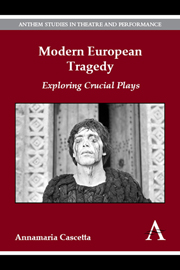Book contents
- Frontmatter
- Dedication
- Contents
- Acknowledgements
- Introduction: The Tragic, Tragedy and the Idea of the Limit
- Chapter 1 Hubris and Guilt: Gengangere (Ghosts)
- Chapter 2 Eve Becomes Mary: L'annonce faite à Marie (The Tidings Brought to Mary)
- Chapter 3 The School of Hatred: Mourning Becomes Electra
- Chapter 4 The Destiny of Man Is Man: Mutter Courage und ihre Kinder (Mother Courage and Her Children)
- Chapter 5 The Tragic and the Absurd: Caligula
- Chapter 6 Dianoetic Laughter in Tragedy: Accepting Finitude: Endgame
- Chapter 7 The Arrogance of Reason and the ‘Disappearance of the Fireflies’: Pilade (Pylades)
- Chapter 8 The Apocalypse of a Civilization: From Akropolis to Apocalypsis cum figuris
- A Provisional Epilogue: Between the Experience and the Representation of the Tragic: Towards a Performative Theatre
- Appendix: Chronology of Productions
- Notes
- Index
Chapter 2 - Eve Becomes Mary: L'annonce faite à Marie (The Tidings Brought to Mary)
Published online by Cambridge University Press: 05 September 2014
- Frontmatter
- Dedication
- Contents
- Acknowledgements
- Introduction: The Tragic, Tragedy and the Idea of the Limit
- Chapter 1 Hubris and Guilt: Gengangere (Ghosts)
- Chapter 2 Eve Becomes Mary: L'annonce faite à Marie (The Tidings Brought to Mary)
- Chapter 3 The School of Hatred: Mourning Becomes Electra
- Chapter 4 The Destiny of Man Is Man: Mutter Courage und ihre Kinder (Mother Courage and Her Children)
- Chapter 5 The Tragic and the Absurd: Caligula
- Chapter 6 Dianoetic Laughter in Tragedy: Accepting Finitude: Endgame
- Chapter 7 The Arrogance of Reason and the ‘Disappearance of the Fireflies’: Pilade (Pylades)
- Chapter 8 The Apocalypse of a Civilization: From Akropolis to Apocalypsis cum figuris
- A Provisional Epilogue: Between the Experience and the Representation of the Tragic: Towards a Performative Theatre
- Appendix: Chronology of Productions
- Notes
- Index
Summary
An entirely different outlook, profoundly influenced by faith in Christianity and inspired by the Gospels, appears in the dramatic development of the tragic awareness of another great writer of the early twentieth century, Paul Claudel. We can choose The Tidings Brought to Mary to explore the theme we are concerned with here.
Tidings is a key text in twentieth-century dramaturgy. The tragic inspiration, sifted through the religious idea of existence and expressed in the modes of high poetry, modulated in lyrical and liturgical patterns, develops into a positive vision.
The text is based on a philosophy of Christian inspiration, fostered by Maritain's personalism and Thomism. Like the works of other great twentieth-century writers, among them T. S. Eliot and Giovanni Testori, it deals with the question, widely discussed by scholars, of the relation between the tragic consciousness and Christian consciousness, and their compatibility.
The tragic action of the character is presented in a very special way, because she is figura Christi. In Christ the finite and infinite coexist. This is because he embodies in himself the concreteness of the human person, situated in time and space, even experiencing death, and total intimacy, which coincides with the absoluteness of the divine. The height of the tragic therefore verges on the denial of the possibility of the tragic. Violaine, however, like Thomas Becket in Eliot's play, is not Christ but figura Christi.
- Type
- Chapter
- Information
- Modern European TragedyExploring Crucial Plays, pp. 31 - 46Publisher: Anthem PressPrint publication year: 2014



